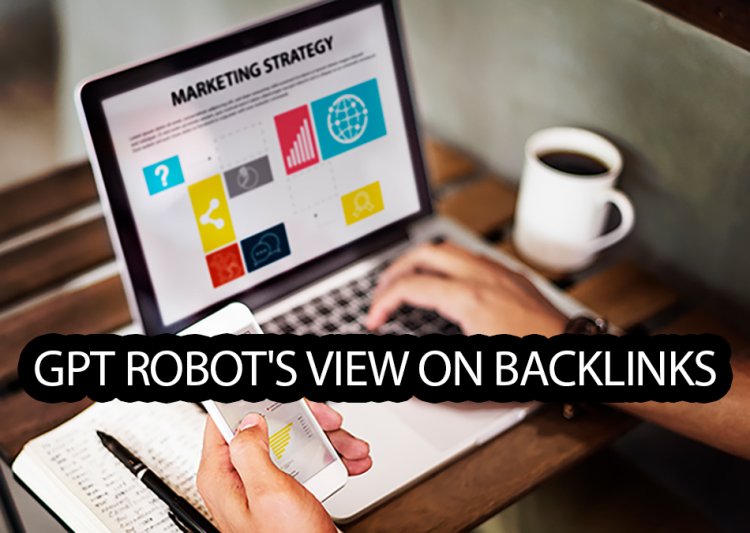Are Backlinks Recommended or Not? GPT Robot Responds
Backlinks, also known as "inbound links" or "incoming links," are hyperlinks from one website to another. When a website links to another site, it creates a backlink. Think of backlinks as votes of confidence from one site to another. They signal to search engines that the content is valuable, credible, and worth referencing.

The Role of Backlinks in SEO
Backlinks are a foundational element of Search Engine Optimization (SEO). They act as endorsements from other websites, indicating that your site is trustworthy and authoritative. Search engines like Google use backlinks as a ranking factor; the more high-quality backlinks a site has, the higher it tends to rank in search engine results pages (SERPs).
Why Backlinks Are Considered Important
Boosting Website Authority
When reputable websites link to your content, it helps establish your website's authority in a particular niche. This is because search engines interpret these backlinks as a sign that your site provides valuable content worth linking to.
Enhancing Search Engine Rankings
Backlinks are one of the key factors in Google’s ranking algorithm. Websites with a strong backlink profile often see higher rankings in search results, which can lead to increased visibility and more traffic.
Driving Organic Traffic
Backlinks not only help with SEO but can also drive direct traffic to your website. If a visitor clicks on a link to your site from another reputable site, it counts as referral traffic, which can boost your site’s overall traffic and potentially lead to more conversions.
The Evolution of Backlinks in SEO
Early Days of SEO and Backlinks
In the early days of SEO, the sheer number of backlinks was enough to propel a website to the top of search results. However, this led to the widespread practice of "link spamming," where sites would acquire large quantities of low-quality or irrelevant backlinks to game the system.
Google's Algorithm Updates and Their Impact on Backlinks
Google’s algorithm updates, such as Penguin, have shifted the focus from quantity to quality. These updates penalized sites with manipulative backlink practices, prioritizing sites with organic, high-quality backlinks.
Current Best Practices for Backlinks
Today, quality trumps quantity. Backlinks from reputable, relevant websites are more valuable than numerous links from low-quality sites. The focus has shifted to building relationships and earning backlinks through high-quality content and ethical SEO practices.
Pros of Using Backlinks
Increased Visibility and Credibility
Having backlinks from reputable sites increases your website’s visibility and credibility. It shows that your site is a trusted source of information, which can boost both your rankings and your brand reputation.
Better Crawling and Indexing
Backlinks help search engine bots discover your site and its content more easily. When search engines find your links on other sites, they follow these links to index your website more effectively.
Competitive Edge in the Market
Websites with a robust backlink profile often outperform their competitors in search rankings. This competitive edge can result in more organic traffic, brand awareness, and revenue.
Cons of Using Backlinks
Potential for Penalties from Search Engines
Engaging in black-hat SEO practices, such as buying backlinks or participating in link schemes, can result in severe penalties from search engines. These penalties can drastically reduce your site’s visibility or even lead to a complete removal from search results.
Risk of Low-Quality or Toxic Backlinks
Not all backlinks are beneficial. Links from spammy or low-authority sites can harm your SEO efforts. It’s crucial to regularly monitor your backlink profile and disavow any toxic backlinks to maintain a healthy SEO status.
Time and Resource Intensive
Building a high-quality backlink profile is time-consuming and requires consistent effort. It involves outreach, relationship-building, and creating valuable content, which can be resource-intensive.
Are All Backlinks Created Equal?
Do-Follow vs. No-Follow Backlinks
Do-follow backlinks pass on "link juice," or SEO value, from one site to another. In contrast, no-follow backlinks do not transfer any SEO value but can still drive traffic and contribute to brand awareness.
The Importance of Relevance and Authority
Backlinks from authoritative and relevant sites carry more weight. A link from a high-authority site like a government or educational institution is far more valuable than one from a low-quality directory.
Natural vs. Manipulative Link Building
Natural backlinks occur when other websites find your content valuable and link to it on their own. In contrast, manipulative practices, like buying or exchanging links, can lead to penalties. The key is to focus on organic, ethical link-building strategies.
Effective Strategies for Building Quality Backlinks
Guest Posting
Guest posting on reputable websites allows you to share your expertise while earning quality backlinks. It’s a win-win situation: the host site gets valuable content, and you get a backlink.
Building Relationships and Networking
Networking with other professionals in your industry can lead to natural backlink opportunities. By establishing relationships, you increase the chances of others linking to your content in a natural, mutually beneficial way.
Creating High-Quality, Shareable Content
The most effective way to earn backlinks is by creating high-quality, valuable content that others want to link to. This includes in-depth guides, original research, and engaging multimedia.
Common Mistakes to Avoid in Backlinking
Buying Backlinks
Buying backlinks is against Google's guidelines and can lead to severe penalties. It’s always better to earn backlinks organically through high-quality content and ethical SEO practices.
Over-Optimizing Anchor Texts
Using the same anchor text for multiple backlinks can appear manipulative to search engines. It’s important to diversify your anchor text to maintain a natural backlink profile.
Ignoring Relevance and Context
Getting backlinks from irrelevant websites can do more harm than good. Always aim for backlinks from sites that are relevant to your niche or industry.
The Future of Backlinks in SEO
Predicted Trends in Backlinking
As search engines become smarter, the emphasis on backlinks may shift. Future trends suggest a greater focus on user experience and content quality, with backlinks playing a more supportive role.
The Role of AI in Backlink Strategy
AI tools are already being used to analyze backlink profiles and develop strategies for building quality links. As AI technology advances, it will likely play a more significant role in shaping SEO and backlinking strategies.
If you think that the backup link is a good option, we can suggest Freela Web. There, you can find freelance professionals and choose from a variety of backlink types.

















